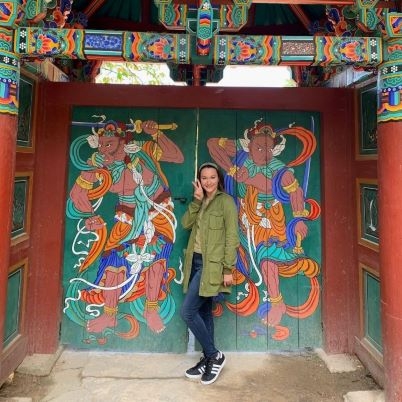CUSE Spotlights
Bethany Mazurek

Bethany Mazurek '18
Major: Anthropology
Minor(s):
Classics, East Asian Studies
Award: Fulbright ETA, South Korea, 2019-2020
- What prompted you to apply to the Fulbright program?
- Before applying to Fulbright, my first experience in Korea had been through CLS Korean, where I spent 2 months in South Korea learning the Korean language. Through Fulbright, I wanted to build upon those skills, experience life long-term in Korea, and improve my knowledge of the Korean language and Korean culture.
- What aspects of your university experience (classes, internships,
leadership positions, service commitments) were most useful to you
as a Fulbrighter?
- Learning about cultural relativity through my anthropology classes definitely came in handy, along with my leadership experience in the club Kpop Group Evolution as the choreographer. The teaching experience from KGE helped shape the teacher I would become, and the knowledge and perspectives I gained through my anthropology classes prepared me to approach a new culture with an open mind.
- What was most unexpected or most challenging in your Fulbright
experience?
- Being in Fulbright and in Korea during the beginning of the COVID-19 pandemic was by far the most stressful part of the entire experience, since it required a lot of adapting to new scenarios sometimes emerging one day after the other. Outside of the extenuating circumstances of COVID, however, the most challenging part of Fulbright was learning to deal with the language barrier. While I had studied Korean, using it in the classroom and using it in day to day life are two very different things, and the isolation that came with not being able to communicate fluently with the people around you can be difficult to adapt to.
- What was most rewarding?
- The relationships I built with the community members, both with other expats and with native Koreans, has been by far the most rewarding part of being in Korea. I've made lifelong friends through the Fulbright experience, and it's something that made all the challenges that came with being in a foreign country during the difficult times of COVID-19 far more bearable.Bonding with my students was another huge reward - being able to personally see how they grow and change during the span of my time with them brought me a lot of joy, along with seeing they grow in confidence with their English skills. Learning another language is difficult, and being able to help others along that path and learning how to communicate with more confidence is a huge reward.
- How did you create connections with your host community beyond the
ETA or S/R experience?
- Through Fulbright, we were all placed with a host family, and they were incredibly helpful and kind with every aspect of my life in Korea. We still keep in contact every once in a while, and their generosity is something I will always remember. In addition, I was able to build friendships with other teachers in my school, people I attended dance classes with, and others throughout the community that made me feel truly welcome in my host city.
- What are you doing now (in terms of study, work, hobbies -
whatever!)?
- I am continuing to teach English in Korea, although no longer under Fulbright. After I finish my last semester here, I plan to apply to graduate school in East Asian Area Studies and continue my study of Korea and East Asia as a whole.
- Did your Fulbright experience contribute in some way to what you
are doing/studying now?
- Beyond the obvious (me still being in Korea) I do feel like the language training, seminars, and connections built through Fulbright have prepared me much more thoroughly for my future than a different English teaching program would have. It also helped deepen my understanding and passion for Korean culture, which has in turn influenced my decision to continue pursuing it in graduate school.
- How did your Fulbright experience prepare you for your future
career?
- It is currently hard to say, since I'm still teaching English and haven't fully settled on what my future career will be, but I do feel that what I learned about teaching in Fulbright helped significantly to prepare me for the variety of experiences I had throughout my time in Korea.
- What advice do you have for those in the application process?
- Make sure to have plenty of people check it over! It helps to have fresh eyes see your application and give you ideas. Don't be afraid to reach out to Fulbright alumni to ask questions as well - I as well as most other alumni I know are always more than happy to answer questions and give advice. Make sure to really think about how you plan to use Fulbright as a stepping stone for your ongoing career path and journey, and show this conviction in your writing!
- What would you want future Fulbrighters to know about the
in-country experience?
- Korea is a wonderful country to be in, with a fascinating history and a welcoming culture. While experiences may vary and it's never going to be 100% easy, Fulbright is an excellent choice if just because of the amount of support and community you get from your fellow Fulbrighters and from host families and co teachers. It's important to be willing to rely on other people, especially in a foreign country, and the nice thing is that there are always others within the community willing to get to know you and help you outside of just the Fulbright program. You are never alone!
Interest Area(s)
Anthropology, Classics, East Asian Studies
Share this spotlight
Return to the listing of cuse spotlights.

